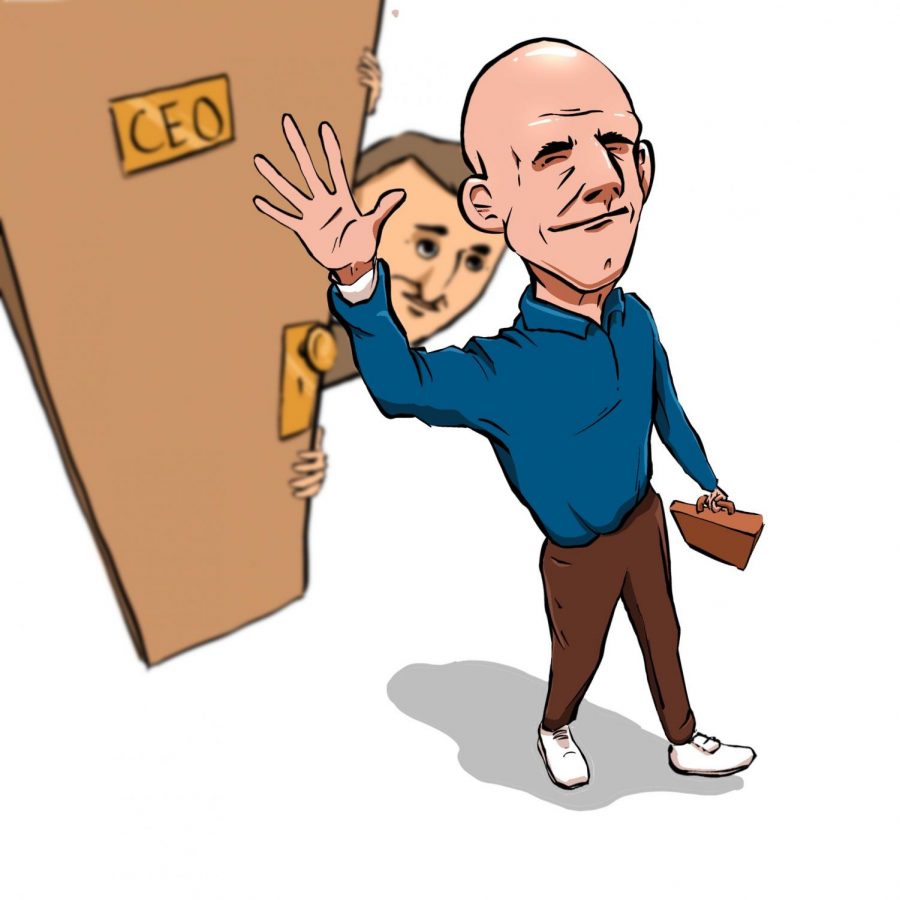Jeff Bezos Passes the Torch to Longtime Amazon Member Andy Jassy
February 26, 2021
On February 2nd Jeff Bezos announced that he will be stepping down from his position as CEO of Amazon, a position he has held for 26 years. Bezos will assume the position of Executive Chair of the Amazon Board in Q3, and taking his place will be Andy Jassy, the current CEO of Amazon Web Services (AWS). Jassy has been a part of Amazon since 1997, while it was still a very small company. Since its establishment in 1994, Amazon has become a tech giant, gaining more than 197 million monthly users, with over 40 subsidiaries—smaller companies controlled by a larger holding company—including the popular platforms Twitch, Goodreads, Audible, and Zappos.
A graduate of Harvard Business School, Jassy took a risk and moved to the West Coast along with several Harvard graduates without knowing what his next job would be. Jassy became the manager of marketing during his early years at the new company. In 2003, Andy Jassy and Jeff Bezos created Amazon Web Services, launched in 2006, a subsidiary of the company that provides a cloud computing platform to users. Jassy was promoted to CEO of AWS in 2016 after his years of leading the AWS team. Many business experts feel comfortable with the transition from Bezos to Jassy, as it was highly predicted considering Jassy’s long history with Amazon.
After Jeff Bezos graduated from Princeton University in 1986 with a computer science/engineering degree, he obtained leadership positions in various firms on Wall Street. Despite his success in hedge funds, Bezos quit his job in 1994 to pursue e-commerce in Seattle. Amazon.com launched in 1995, and sales took off dramatically. The site went public two years later and continued to grow into the trillion-dollar company we now know today. With the spike in online shopping due to the coronavirus, Amazon sales increased 40 percent in the past year.
Amazon is becoming an increasingly common household tool for families to receive their goods and services safely. Because of the current spotlight on Amazon, many concerns have been raised about the company’s failure to provide suitable working conditions for its employees in factories, evidence of tax evasion, and using enslaved child workers to cheaply produce goods. The scrutiny has caused a movement of consumers pledging to boycott Amazon and all of its services. Those who can are looking for online companies with ethical practices to provide their business to. The phrase, “no ethical consumption under capitalism” has been circling social media, defending those who continue to shop at companies like Amazon. This phrase means that in our capitalist society, there is no way that shoppers will not be supporting unethical companies, and most cannot afford to support smaller businesses.
After discussing this matter with students at CRLS, many expressed that boycotting Amazon can be difficult, because of the convenience and products that are exclusively available on the site. Abyan Shire ’22 says, “I wish we could boycott Amazon, but it does not seem realistic because of how it has become ingrained and normalized in our lives.” Samichhya Ghimire ’23 believes that taking down the tech giant could be too large of a task for a few vocal consumers. “I think Amazon should be held accountable and I think it will take more than boycotting them, because Amazon is such a huge company and it has a lot of power. Although … I think boycotting will bring us a step closer to showing [Amazon executives] that something has to change.”
With his new position as Executive Chair of Amazon, Bezos will have the opportunity to work directly above the Board of Directors, managing the interests of investors, and the profit and stability of Amazon as a whole. As CEO, he had the responsibility of overseeing the day-to-day logistical issues and making quick decisions to protect the company’s operations. At the end of the day, Jeff Bezos still has a substantial amount of power in Amazon.
Jassy shares similar views with Bezos, so not much change is expected in the way the company is currently run. Business experts are expecting a shift toward prioritizing more environmentally friendly production and distribution of goods. This is due to pressure from employees and shareholders to reduce emissions to improve the company’s carbon footprint. Hopefully under this new leadership, Amazon will be able to achieve goals to better the environment and ethically manufacture products.










